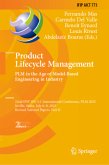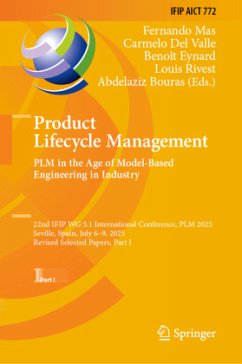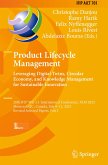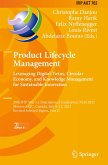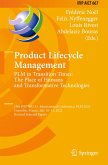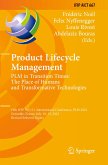Product Lifecycle Management. Integrating Digital Technologies for Sustainability and Innovation
21st IFIP WG 5.1 International Conference, PLM 2024, Bangkok, Thailand, July 7-10, 2024, Revised Selected Papers, Part I
Herausgegeben:Sureephong, Pradorn; Danjou, Christophe; Bouras, Abdelaziz
Product Lifecycle Management. Integrating Digital Technologies for Sustainability and Innovation
21st IFIP WG 5.1 International Conference, PLM 2024, Bangkok, Thailand, July 7-10, 2024, Revised Selected Papers, Part I
Herausgegeben:Sureephong, Pradorn; Danjou, Christophe; Bouras, Abdelaziz
- Gebundenes Buch
- Merkliste
- Auf die Merkliste
- Bewerten Bewerten
- Teilen
- Produkt teilen
- Produkterinnerung
- Produkterinnerung
This two-volume set constitutes the refereed proceedings of the 21st IFIP WG 5.1 International Conference on Product Lifecycle Management, PLM 2024, held in Bangkok, Thailand, during July 7-10, 2024.
The 64 full papers presented in this book were carefully reviewed and selected from 105 submissions. PLM 2024 aims to integrate business approaches to the collaborative creation, management and dissemination of product and process data throughout the extended enterprises that create, manufacture and operate engineered products and systems.
Andere Kunden interessierten sich auch für
![Product Lifecycle Management. Leveraging AI, Digital Twins, and Smart Technologies Product Lifecycle Management. Leveraging AI, Digital Twins, and Smart Technologies]() Product Lifecycle Management. Leveraging AI, Digital Twins, and Smart Technologies136,99 €
Product Lifecycle Management. Leveraging AI, Digital Twins, and Smart Technologies136,99 €![Product Lifecycle Management. PLM in the Age of Model-Based Engineering in Industry Product Lifecycle Management. PLM in the Age of Model-Based Engineering in Industry]() Product Lifecycle Management. PLM in the Age of Model-Based Engineering in Industry91,99 €
Product Lifecycle Management. PLM in the Age of Model-Based Engineering in Industry91,99 €![Product Lifecycle Management. PLM in the Age of Model-Based Engineering in Industry Product Lifecycle Management. PLM in the Age of Model-Based Engineering in Industry]() Product Lifecycle Management. PLM in the Age of Model-Based Engineering in Industry136,99 €
Product Lifecycle Management. PLM in the Age of Model-Based Engineering in Industry136,99 €![Product Lifecycle Management. Leveraging Digital Twins, Circular Economy, and Knowledge Management for Sustainable Innovation Product Lifecycle Management. Leveraging Digital Twins, Circular Economy, and Knowledge Management for Sustainable Innovation]() Product Lifecycle Management. Leveraging Digital Twins, Circular Economy, and Knowledge Management for Sustainable Innovation83,99 €
Product Lifecycle Management. Leveraging Digital Twins, Circular Economy, and Knowledge Management for Sustainable Innovation83,99 €![Product Lifecycle Management. Leveraging Digital Twins, Circular Economy, and Knowledge Management for Sustainable Innovation Product Lifecycle Management. Leveraging Digital Twins, Circular Economy, and Knowledge Management for Sustainable Innovation]() Product Lifecycle Management. Leveraging Digital Twins, Circular Economy, and Knowledge Management for Sustainable Innovation83,99 €
Product Lifecycle Management. Leveraging Digital Twins, Circular Economy, and Knowledge Management for Sustainable Innovation83,99 €![Product Lifecycle Management. PLM in Transition Times: The Place of Humans and Transformative Technologies Product Lifecycle Management. PLM in Transition Times: The Place of Humans and Transformative Technologies]() Product Lifecycle Management. PLM in Transition Times: The Place of Humans and Transformative Technologies113,99 €
Product Lifecycle Management. PLM in Transition Times: The Place of Humans and Transformative Technologies113,99 €![Product Lifecycle Management. PLM in Transition Times: The Place of Humans and Transformative Technologies Product Lifecycle Management. PLM in Transition Times: The Place of Humans and Transformative Technologies]() Product Lifecycle Management. PLM in Transition Times: The Place of Humans and Transformative Technologies113,99 €
Product Lifecycle Management. PLM in Transition Times: The Place of Humans and Transformative Technologies113,99 €-
-
-
This two-volume set constitutes the refereed proceedings of the 21st IFIP WG 5.1 International Conference on Product Lifecycle Management, PLM 2024, held in Bangkok, Thailand, during July 7-10, 2024.
The 64 full papers presented in this book were carefully reviewed and selected from 105 submissions. PLM 2024 aims to integrate business approaches to the collaborative creation, management and dissemination of product and process data throughout the extended enterprises that create, manufacture and operate engineered products and systems.
The 64 full papers presented in this book were carefully reviewed and selected from 105 submissions. PLM 2024 aims to integrate business approaches to the collaborative creation, management and dissemination of product and process data throughout the extended enterprises that create, manufacture and operate engineered products and systems.
Produktdetails
- Produktdetails
- IFIP Advances in Information and Communication Technology 740
- Verlag: Springer / Springer Nature Switzerland / Springer, Berlin
- Artikelnr. des Verlages: 978-3-031-93318-9
- Seitenzahl: 520
- Erscheinungstermin: 10. Juli 2025
- Englisch
- Abmessung: 241mm x 160mm x 34mm
- Gewicht: 937g
- ISBN-13: 9783031933189
- ISBN-10: 3031933184
- Artikelnr.: 73889459
- Herstellerkennzeichnung
- Springer-Verlag GmbH
- Tiergartenstr. 17
- 69121 Heidelberg
- ProductSafety@springernature.com
- IFIP Advances in Information and Communication Technology 740
- Verlag: Springer / Springer Nature Switzerland / Springer, Berlin
- Artikelnr. des Verlages: 978-3-031-93318-9
- Seitenzahl: 520
- Erscheinungstermin: 10. Juli 2025
- Englisch
- Abmessung: 241mm x 160mm x 34mm
- Gewicht: 937g
- ISBN-13: 9783031933189
- ISBN-10: 3031933184
- Artikelnr.: 73889459
- Herstellerkennzeichnung
- Springer-Verlag GmbH
- Tiergartenstr. 17
- 69121 Heidelberg
- ProductSafety@springernature.com
.-Circular economy rebound effect: theoretical implications and a research agenda.
.- Multi-Aspect Ontologies as Support for Quantified Products Lifecycle Management.
.- A Digital Twin Implementation Framework For Collaborative Robots.
.- A procedure model for systematic application of Generative Engineering and Design software tools.
.- Exploring Model-Based Systems Architecting Digital Threads in Virtual Reality.
.- Development and Validation of a Maturity Model for digital servitization of manufacturing companies.
.- Mapping The Utilisation Of I4.0 And I5.0 Technologies Along The Product Life Cycle To Enable Circular Economy Endeavours.
.- Enhancing Data Integrity with CSDT: A Solution to Predict Data Disturbance in IoT Systems.
.- Enhancing Learning Experience Through Micro-Learning Activities for Cost Managers in Restaurants Amidst Digital Transformation.
.- Lifecycle-Orientated Cost Estimation In The Early Phase Of Factory Planning.
.- Enhancing German Manufacturing Competitiveness: Integrating B2B Platforms into the Industrial Value Chain.
.- Managing Heterogeneous Historical Data within the Digital Twin Paradigm.
.- Enabling Ontology-based Knowledge Linking in Smart Product Innovation Processes.
.- Integrating Assembly Sequence Planning into Product Lifecycle Management.
.- Discrete Event Simulation based Approach for Cyber Physical Logistics System development.
.- Universal, Bi-directional Real Time Communication Between Real and Digital Twin in an MBSE Environment.
.- Embracing Lifecycle Modularity and Postponement in Urban Architecture.
.- A Value Driven Digital Twin For Academic Purposes.
.- Framework Decision Support System software comparison in the agri-food industry: a preliminary study.
.- Twin Transition Waste Electric and Electronic Equipment Roadmapping Tool To Support Improvement Of Environmental Sustainability Performance Of Reverse E-waste Value Chains.
.- Virtual Voyages: Enhancing Cultural Heritage Tourism through VR360 Experiences of Wat Sri Suphan.
.- A Comparative Study on the Use of Artificial Intelligence and Other Approaches for Biomimetic Design: Application in Packaging Innovation for Fragile Products.
.- Designing Augmented Reality Games for the Future of Cultural Heritage Tourism: The Case of Wua-Lai Communities.
.- Advancing Smart Process Planning: Automated Generation of the Bill of Process for Rotational Parts using Graph Neural Networks.
.- Key Design Conflict Identification for Complex Product Based on Causal Discovery.
.- A Proposition to Leverage Productization, Modularity, and Sharing in Design to Improve the Lifecycle Performance of Rural Healthcare Delivery System.
.- Overview of MBSE and PLM Integration from a Traceability Perspective: a Mechatronic Case Study.
.- A Proposed Product Data Model for Vaccine Lifecycle Management.
.- Towards a personalized knowledge graph thanks to gamification.
.- The Role of Modularity in a Factory in Space.
.- Integrating Digital Twins for Enhancing Smart Agriculture within a Circular Economy Framework.
.- Digital Twins for Waste Management in Manufacturing: Preliminary Investigation on Possible Uses.
.- Named Entity Recognition for Building Information Model Verification Using Large Language Models.
.- ESG Digital Twin.
.- Managing organizational transformation within PLM approach between theory and practice.
.- Evaluating The Sustainability Of Artificial Intelligence Applications Across The Product Lifecycle.
.- Multi-Aspect Ontologies as Support for Quantified Products Lifecycle Management.
.- A Digital Twin Implementation Framework For Collaborative Robots.
.- A procedure model for systematic application of Generative Engineering and Design software tools.
.- Exploring Model-Based Systems Architecting Digital Threads in Virtual Reality.
.- Development and Validation of a Maturity Model for digital servitization of manufacturing companies.
.- Mapping The Utilisation Of I4.0 And I5.0 Technologies Along The Product Life Cycle To Enable Circular Economy Endeavours.
.- Enhancing Data Integrity with CSDT: A Solution to Predict Data Disturbance in IoT Systems.
.- Enhancing Learning Experience Through Micro-Learning Activities for Cost Managers in Restaurants Amidst Digital Transformation.
.- Lifecycle-Orientated Cost Estimation In The Early Phase Of Factory Planning.
.- Enhancing German Manufacturing Competitiveness: Integrating B2B Platforms into the Industrial Value Chain.
.- Managing Heterogeneous Historical Data within the Digital Twin Paradigm.
.- Enabling Ontology-based Knowledge Linking in Smart Product Innovation Processes.
.- Integrating Assembly Sequence Planning into Product Lifecycle Management.
.- Discrete Event Simulation based Approach for Cyber Physical Logistics System development.
.- Universal, Bi-directional Real Time Communication Between Real and Digital Twin in an MBSE Environment.
.- Embracing Lifecycle Modularity and Postponement in Urban Architecture.
.- A Value Driven Digital Twin For Academic Purposes.
.- Framework Decision Support System software comparison in the agri-food industry: a preliminary study.
.- Twin Transition Waste Electric and Electronic Equipment Roadmapping Tool To Support Improvement Of Environmental Sustainability Performance Of Reverse E-waste Value Chains.
.- Virtual Voyages: Enhancing Cultural Heritage Tourism through VR360 Experiences of Wat Sri Suphan.
.- A Comparative Study on the Use of Artificial Intelligence and Other Approaches for Biomimetic Design: Application in Packaging Innovation for Fragile Products.
.- Designing Augmented Reality Games for the Future of Cultural Heritage Tourism: The Case of Wua-Lai Communities.
.- Advancing Smart Process Planning: Automated Generation of the Bill of Process for Rotational Parts using Graph Neural Networks.
.- Key Design Conflict Identification for Complex Product Based on Causal Discovery.
.- A Proposition to Leverage Productization, Modularity, and Sharing in Design to Improve the Lifecycle Performance of Rural Healthcare Delivery System.
.- Overview of MBSE and PLM Integration from a Traceability Perspective: a Mechatronic Case Study.
.- A Proposed Product Data Model for Vaccine Lifecycle Management.
.- Towards a personalized knowledge graph thanks to gamification.
.- The Role of Modularity in a Factory in Space.
.- Integrating Digital Twins for Enhancing Smart Agriculture within a Circular Economy Framework.
.- Digital Twins for Waste Management in Manufacturing: Preliminary Investigation on Possible Uses.
.- Named Entity Recognition for Building Information Model Verification Using Large Language Models.
.- ESG Digital Twin.
.- Managing organizational transformation within PLM approach between theory and practice.
.- Evaluating The Sustainability Of Artificial Intelligence Applications Across The Product Lifecycle.
.-Circular economy rebound effect: theoretical implications and a research agenda.
.- Multi-Aspect Ontologies as Support for Quantified Products Lifecycle Management.
.- A Digital Twin Implementation Framework For Collaborative Robots.
.- A procedure model for systematic application of Generative Engineering and Design software tools.
.- Exploring Model-Based Systems Architecting Digital Threads in Virtual Reality.
.- Development and Validation of a Maturity Model for digital servitization of manufacturing companies.
.- Mapping The Utilisation Of I4.0 And I5.0 Technologies Along The Product Life Cycle To Enable Circular Economy Endeavours.
.- Enhancing Data Integrity with CSDT: A Solution to Predict Data Disturbance in IoT Systems.
.- Enhancing Learning Experience Through Micro-Learning Activities for Cost Managers in Restaurants Amidst Digital Transformation.
.- Lifecycle-Orientated Cost Estimation In The Early Phase Of Factory Planning.
.- Enhancing German Manufacturing Competitiveness: Integrating B2B Platforms into the Industrial Value Chain.
.- Managing Heterogeneous Historical Data within the Digital Twin Paradigm.
.- Enabling Ontology-based Knowledge Linking in Smart Product Innovation Processes.
.- Integrating Assembly Sequence Planning into Product Lifecycle Management.
.- Discrete Event Simulation based Approach for Cyber Physical Logistics System development.
.- Universal, Bi-directional Real Time Communication Between Real and Digital Twin in an MBSE Environment.
.- Embracing Lifecycle Modularity and Postponement in Urban Architecture.
.- A Value Driven Digital Twin For Academic Purposes.
.- Framework Decision Support System software comparison in the agri-food industry: a preliminary study.
.- Twin Transition Waste Electric and Electronic Equipment Roadmapping Tool To Support Improvement Of Environmental Sustainability Performance Of Reverse E-waste Value Chains.
.- Virtual Voyages: Enhancing Cultural Heritage Tourism through VR360 Experiences of Wat Sri Suphan.
.- A Comparative Study on the Use of Artificial Intelligence and Other Approaches for Biomimetic Design: Application in Packaging Innovation for Fragile Products.
.- Designing Augmented Reality Games for the Future of Cultural Heritage Tourism: The Case of Wua-Lai Communities.
.- Advancing Smart Process Planning: Automated Generation of the Bill of Process for Rotational Parts using Graph Neural Networks.
.- Key Design Conflict Identification for Complex Product Based on Causal Discovery.
.- A Proposition to Leverage Productization, Modularity, and Sharing in Design to Improve the Lifecycle Performance of Rural Healthcare Delivery System.
.- Overview of MBSE and PLM Integration from a Traceability Perspective: a Mechatronic Case Study.
.- A Proposed Product Data Model for Vaccine Lifecycle Management.
.- Towards a personalized knowledge graph thanks to gamification.
.- The Role of Modularity in a Factory in Space.
.- Integrating Digital Twins for Enhancing Smart Agriculture within a Circular Economy Framework.
.- Digital Twins for Waste Management in Manufacturing: Preliminary Investigation on Possible Uses.
.- Named Entity Recognition for Building Information Model Verification Using Large Language Models.
.- ESG Digital Twin.
.- Managing organizational transformation within PLM approach between theory and practice.
.- Evaluating The Sustainability Of Artificial Intelligence Applications Across The Product Lifecycle.
.- Multi-Aspect Ontologies as Support for Quantified Products Lifecycle Management.
.- A Digital Twin Implementation Framework For Collaborative Robots.
.- A procedure model for systematic application of Generative Engineering and Design software tools.
.- Exploring Model-Based Systems Architecting Digital Threads in Virtual Reality.
.- Development and Validation of a Maturity Model for digital servitization of manufacturing companies.
.- Mapping The Utilisation Of I4.0 And I5.0 Technologies Along The Product Life Cycle To Enable Circular Economy Endeavours.
.- Enhancing Data Integrity with CSDT: A Solution to Predict Data Disturbance in IoT Systems.
.- Enhancing Learning Experience Through Micro-Learning Activities for Cost Managers in Restaurants Amidst Digital Transformation.
.- Lifecycle-Orientated Cost Estimation In The Early Phase Of Factory Planning.
.- Enhancing German Manufacturing Competitiveness: Integrating B2B Platforms into the Industrial Value Chain.
.- Managing Heterogeneous Historical Data within the Digital Twin Paradigm.
.- Enabling Ontology-based Knowledge Linking in Smart Product Innovation Processes.
.- Integrating Assembly Sequence Planning into Product Lifecycle Management.
.- Discrete Event Simulation based Approach for Cyber Physical Logistics System development.
.- Universal, Bi-directional Real Time Communication Between Real and Digital Twin in an MBSE Environment.
.- Embracing Lifecycle Modularity and Postponement in Urban Architecture.
.- A Value Driven Digital Twin For Academic Purposes.
.- Framework Decision Support System software comparison in the agri-food industry: a preliminary study.
.- Twin Transition Waste Electric and Electronic Equipment Roadmapping Tool To Support Improvement Of Environmental Sustainability Performance Of Reverse E-waste Value Chains.
.- Virtual Voyages: Enhancing Cultural Heritage Tourism through VR360 Experiences of Wat Sri Suphan.
.- A Comparative Study on the Use of Artificial Intelligence and Other Approaches for Biomimetic Design: Application in Packaging Innovation for Fragile Products.
.- Designing Augmented Reality Games for the Future of Cultural Heritage Tourism: The Case of Wua-Lai Communities.
.- Advancing Smart Process Planning: Automated Generation of the Bill of Process for Rotational Parts using Graph Neural Networks.
.- Key Design Conflict Identification for Complex Product Based on Causal Discovery.
.- A Proposition to Leverage Productization, Modularity, and Sharing in Design to Improve the Lifecycle Performance of Rural Healthcare Delivery System.
.- Overview of MBSE and PLM Integration from a Traceability Perspective: a Mechatronic Case Study.
.- A Proposed Product Data Model for Vaccine Lifecycle Management.
.- Towards a personalized knowledge graph thanks to gamification.
.- The Role of Modularity in a Factory in Space.
.- Integrating Digital Twins for Enhancing Smart Agriculture within a Circular Economy Framework.
.- Digital Twins for Waste Management in Manufacturing: Preliminary Investigation on Possible Uses.
.- Named Entity Recognition for Building Information Model Verification Using Large Language Models.
.- ESG Digital Twin.
.- Managing organizational transformation within PLM approach between theory and practice.
.- Evaluating The Sustainability Of Artificial Intelligence Applications Across The Product Lifecycle.


